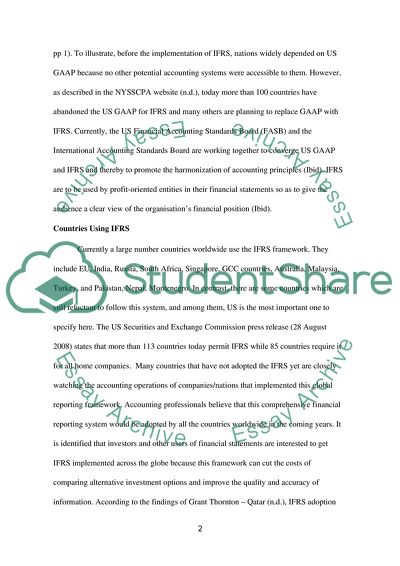Cite this document
(Accounting as the World First Global Profession Essay Example | Topics and Well Written Essays - 1500 words, n.d.)
Accounting as the World First Global Profession Essay Example | Topics and Well Written Essays - 1500 words. https://studentshare.org/finance-accounting/1863055-today-international-financial-reporting-standard-ifrs-means-that-the-outlook-for-financial-reporting-is-the-same-for-most-countries-in-the-world-accounting-is-on-the-cusp-of-becoming-the-worlds-first-global-profession-largely-thanks-to-ifrs
Accounting as the World First Global Profession Essay Example | Topics and Well Written Essays - 1500 words. https://studentshare.org/finance-accounting/1863055-today-international-financial-reporting-standard-ifrs-means-that-the-outlook-for-financial-reporting-is-the-same-for-most-countries-in-the-world-accounting-is-on-the-cusp-of-becoming-the-worlds-first-global-profession-largely-thanks-to-ifrs
(Accounting As the World First Global Profession Essay Example | Topics and Well Written Essays - 1500 Words)
Accounting As the World First Global Profession Essay Example | Topics and Well Written Essays - 1500 Words. https://studentshare.org/finance-accounting/1863055-today-international-financial-reporting-standard-ifrs-means-that-the-outlook-for-financial-reporting-is-the-same-for-most-countries-in-the-world-accounting-is-on-the-cusp-of-becoming-the-worlds-first-global-profession-largely-thanks-to-ifrs.
Accounting As the World First Global Profession Essay Example | Topics and Well Written Essays - 1500 Words. https://studentshare.org/finance-accounting/1863055-today-international-financial-reporting-standard-ifrs-means-that-the-outlook-for-financial-reporting-is-the-same-for-most-countries-in-the-world-accounting-is-on-the-cusp-of-becoming-the-worlds-first-global-profession-largely-thanks-to-ifrs.
“Accounting As the World First Global Profession Essay Example | Topics and Well Written Essays - 1500 Words”. https://studentshare.org/finance-accounting/1863055-today-international-financial-reporting-standard-ifrs-means-that-the-outlook-for-financial-reporting-is-the-same-for-most-countries-in-the-world-accounting-is-on-the-cusp-of-becoming-the-worlds-first-global-profession-largely-thanks-to-ifrs.


